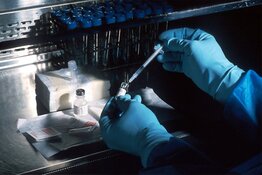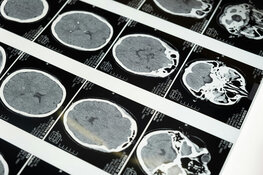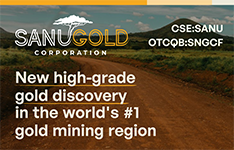Rakovina Therapeutics Inc. (RKV:TSX.V) announced it has received the first synthesized batch of artificial intelligence-generated ATR inhibitor compounds developed in collaboration with Variational AI.
Rakovina announced in a release that its partnership with Variational AI to leverage the Enki generative AI platform for the development of next generation DNA damage response inhibitors.
Following a rigorous AI-driven selection process, Rakovina said it has shortlisted the most promising ATR inhibitor candidates for synthesis and the first batch of these compounds will move into preclinical testing at Rakovina's state-of-the-art integrated wet lab for further evaluation and validation.
Results from this phase will guide the selection of lead candidates for further optimization and potential clinical development, Rakovina said.
"We are excited to advance our first AI-designed ATR inhibitors into preclinical testing," Executive Chairman Jeffrey Bacha said. "This represents a major step in leveraging generative AI for drug discovery. The speed and precision of AI in identifying novel, high-potential compounds will significantly accelerate the development of next-generation cancer therapies."
ATR (ataxia telangiectasia and Rad3 related) inhibitors play a critical role in targeting cancers with DNA repair deficiencies, such as ovarian, breast and prostate cancers, Rakovina noted. Despite the potential of ATR inhibitors, no Food and Drug Administration-approved treatments currently exist in this category.
"Rakovina's artificial-intelligence-driven approach aims to address this gap by rapidly identifying and optimizing ATR-targeted compounds with strong therapeutic potential, including candidates designed to effectively cross the blood-brain barrier, offering new hope for patients with cancers that affect the central nervous system," the company said.
Rakovina currently integrates proprietary AI platforms such as Deep Docking™ and Enki™, which enable the rapid screening of billions of molecular compounds to identify promising candidates targeting DNA-damage response (DDR) mechanisms in cancer. The company's AI-driven approach has significantly reduced the time and cost of preclinical drug discovery, offering a competitive edge in the US$18 billion DDR therapeutics market projected for 2030.
Co. to Present Abstracts at National Meeting
The company also announced that two of its abstracts have been accepted for presentation at the 2025 American Association for Cancer Research's annual meeting in April in Chicago.
The first abstract deals with the discovery of novel PARP1 selective inhibitors for treatment of brain tumors using artificial intelligence.
By leveraging deep docking, a deep-learning-based virtual screening method, alongside generative AI algorithms, Rakovina said researchers rapidly identified potential compounds with strong PARP1 selectivity and BBB penetration.
"The study presents findings from in silico screening of billions of compounds, followed by in vitro and in vivo validation of their efficacy, selectivity and pharmacokinetic properties," Rakovina said in another release on March 25. "This artificial intelligence-driven approach enhances the efficiency of drug discovery, offering a promising new treatment option for brain tumors."
The second abstract the company will present utilizes AI for the discovery of a novel CNS-penetrating ATR inhibitor for treating brain tumors.
ATR plays a key role in DNA damage repair and shows therapeutic potential, but Rakovina said current options have poor blood-brain-barrier permeability, limiting their effectiveness against brain tumors and metastases.
The Enki platform's AI-driven approach utilizing generative models and deep learning was employed to design de novo molecules with optimized potency, selectivity, and BBB penetration.
"This is an exceptional accomplishment for Rakovina," Bacha said. "Being selected by AACR for two projects highlights the significance of our innovations in drug discovery and their potential to impact patients battling aggressive, treatment-resistant cancers."
According to Rakovina, its proprietary integration of the Deep Docking and Enki AI platforms "allows its scientists to evaluate billions of potential compounds at 100 times the speed of traditional methods," the company said.
"What we're seeing with Rakovina's AI-enabled pipeline is the future of oncology — faster, smarter and more precise," said Dr. Mads Daugaard, president and chief scientific officer of Rakovina. "This integration of generative AI and biological insight is transforming how — and how quickly — we can identify and advance new therapies."
The Catalyst: Cells Survive Following Repairs
DDR comprises an orchestrated network of pathways that signal not only for repair of DNA lesions but also for activation of checkpoints, which are responsible for cell arrest at key points in the cell cycle.
Poly(ADP-ribose) polymerase (PARP) inhibitors were the first DDR therapeutic "blockbuster" drugs, with a global market expected to surpass US$8.8 billion by 2027, the company said. Recent major acquisitions including the US$14 billion purchase of Medivation by Pfizer and the US$5.1 billion purchase of Tesaro by GSK in 2019 were both driven by their PARP expertise.
According to the WHO, cancer is presently the second leading cause of death worldwide, research by Roots Analysis said.
"As per GLOBOCAN, the number of patients diagnosed with various types of cancer in the U.S. crossed the 19 million-mark in 2020," the firm wrote. "By 2030, it is estimated that the aforementioned number is likely to grow to over 22 million."
Conventional approaches, such as chemotherapy, surgery and radiation therapy, have been found to be inadequate, especially for late-stage cancers.
"If the therapeutic-induced DNA damage is repaired, the cells survive," Roots Analysis wrote.
The role of artificial intelligence (AI) in the biopharmaceutical sector has also become increasingly prominent. Writing for BioSpace on January 8, Bryan Spielman emphasized that AI is delivering substantial benefits in drug discovery, particularly by expediting data analysis and streamlining the identification of promising drug candidates. While AI's integration into patient recruitment and clinical research is still developing, its applications in research and commercialization are already reshaping industry practices.
Further evidence of AI's transformative potential in biopharmaceuticals is provided by Precedence Research, which released market data in January 2025. Their report projects the global biopharmaceutical market size to grow from US$537.54 billion in 2025 to US$1.8 trillion by 2034, achieving a compound annual growth rate (CAGR) of 14.36%.
 Streetwise Ownership Overview*
Streetwise Ownership Overview*
Rakovina Therapeutics Inc. (RKV:TSX.V)
The integration of AI across various stages of the biopharmaceutical process, including drug discovery, clinical trials, and personalized medicine, has been cited as a critical driver of this growth. Precedence Research also highlighted that the oncology segment continues to dominate the market due to the increasing global cancer burden and the rising adoption of biopharmaceuticals for targeted cancer therapies.
Ownership and Share Structure
Edison Oncology owns 17.27% of Rakovina Therapeutics.
Management and Reporting Insiders own 5.92%, with the top two being Jeffrey Bacha and Alfredo De Lucrezia.
The rest is friends/family and retail.
Rakovina Therapeutics Inc. has more than 90 million shares outstanding and a market capitalization of approximately CA$16.14 million. Over the past 52 weeks, its stock has traded between CA$0.23 and CA$0.05.
| Want to be the first to know about interesting Biotechnology / Pharmaceuticals investment ideas? Sign up to receive the FREE Streetwise Reports' newsletter. | Subscribe |
Important Disclosures:
- Rakovina Therapeutics Inc. has a consulting relationship with Street Smart an affiliate of Streetwise Reports. Street Smart Clients pay a monthly consulting fee between US$8,000 and US$20,000.
- As of the date of this article, officers and/or employees of Streetwise Reports LLC (including members of their household) own securities of Rakovina Therapeutics Inc.
- Steve Sobek wrote this article for Streetwise Reports LLC and provides services to Streetwise Reports as an employee.
- This article does not constitute investment advice and is not a solicitation for any investment. Streetwise Reports does not render general or specific investment advice and the information on Streetwise Reports should not be considered a recommendation to buy or sell any security. Each reader is encouraged to consult with his or her personal financial adviser and perform their own comprehensive investment research. By opening this page, each reader accepts and agrees to Streetwise Reports' terms of use and full legal disclaimer. Streetwise Reports does not endorse or recommend the business, products, services or securities of any company.
- This article does not constitute medical advice. Officers, employees and contributors to Streetwise Reports are not licensed medical professionals. Readers should always contact their healthcare professionals for medical advice.
For additional disclosures, please click here.









































